|
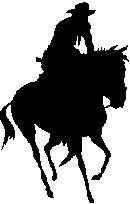
December 2011 – February 2012
BACKTRAILS
September 2011
Real/Reel Cowboys
Ebooks debate
Serenade for Misfit Lil
June 2011
Lessons from True Grit
Tha Ballad of Jack Martin
Ross Morton beginnings
ABC of Branding
March 2011
Trouble with Misfit Lil
Horse Opera Renaissance
Fargo Creator's Pattern
December 2010
Books for Writers
Read by Jake Douglas
The Talking Wire
September 2010
Joshua Dillard
Paperback Blues
Remington Part 3
June 2010
Imagination in the Saddle
Last word on Blurbs
Remington Part 2
March 2010
Jack Martin #2
Justice and the Western
Frederic Remington
December 2009
Ross Morton
Faith and a Fast Gun
Sex and Violence
Gold Robbery Mystery
September 2009
Steve Hayes
BHE Books
Paul Lederer
Accurate words
June 2009
Jack Martin
Series Heroes
Riding the Range
March 2009
Blast to Oblivion
Tyler Hatch and Twins
Night Herding
Walt Masterson
December 2008
All Guns Blazing
Jim Bowden & Co.
Revolver Conversions
September 2008
Western Noir
Power of the Premise
West on Wheels
June 2008
Plot or Not Debate
Jack Giles
Whitney Revolver
March 2008
Walt Masterson
Plotters and Pantsers
More Horse Talk
December 2007
Peace at Any Price
Dan Claymaker
Horse Sense
September 2007
Artist Michael Thomas
Judging by Covers
The Schofield Revolver
June 2007
David Whitehead
Realistic Ballistics
Plot Twists
March 2007
Crime/western fiction
The Walker Colt
Sydney J. Bounds
December 2006
Lauran Paine
Jake Douglas & Co.
September
2006
Misfit Lil
Greg Mitchell
June
2006
Marshall Grover
Facts for Fiction
March 2006
Jeff Sadler
Mike Stotter
Writers and Money
|
BLACK
HORSE EXTRA
Riders of the Tenderfoot Trail Hoofprints
Gunfight at the Ebook Corral
The Gunfighters and Their Weapons
New Black Horse Westerns Chap O'Keefe Ebooks
A shrinking percentage of Black Horse Western authors are
veteran, lifetime professional writers with credits in multiple
genres and media: film, television, paperback originals, and comic
books. Today, many more are novices and sometimes retirees
from other professions or trades, realizing lifelong dreams of
seeing their work in print through the good offices of the books' UK
publisher, Robert Hale Ltd.
Indeed, writing BHWs may soon become solely the province of the hobbyist.
There are several reasons for this. Most significantly, the cash rewards
continue to dwindle in real terms. Another income stream, or a comfortable
nest-egg, is essential to sustain anything like a normal life style while
writing fiction destined largely for the public libraries where
each single copy will be read "free", possibly hundreds of times.
For the hard-working, full-time writer of yesteryear, the western novel
remains a feasible route to a partial livelihood in only a
handful of cases.
It has been suggested the publishers could subsidize their
purchasing budgets by reprinting still-readable, classic westerns
from bygone decades. ln answer, one publisher of large-print editions
tells us regretfully that this supply has been largely exhausted, asking: "Do you have any further backlist titles
that you may be able to sell us?" Moreover, when possibilities for reissues
are unearthed, the families and literary agents representing the
estates of excellent writers turn up their noses at the money
offered, although it might be the same sum struggling living writers and
the hobbyists are accepting for new work.
The publisher quoted also says, "Thank you for all your help. I really do
appreciate all the time you are giving to hunting down western writers for me.
It’s a pity, as you say, that literary agents do not have any idea of the
real value of westerns. I'm afraid the world is getting tougher to deal
with by the second. The library closures are quite worrying and our print runs
are having to be slashed. Who knows what the future holds for book lovers?"
One BHW writer tells us, "It isn't about making money; it's about
reaching readers." And that is undeniable, but we do question a
situation where the work of a new and excited part-timer can go
out to the public, because he is happy with a pittance, while it
makes no commercial sense for an old
hand to expend yet more time and energy in trying to benefit from his expertise.
A short novel that has taken 160 hours or more to produce
currently makes for its author, over a period of three years in
which standard and large-print editions appear, the money deemed in
most civilized countries the legal minimum for a waged worker
putting in 60 hours and collecting his pay immediately.
These are the sort of conditions under which the group once termed
"journeymen" or "mid-list" fiction writers has become virtually
extinct. As a consequence, we have a huge gap between a tiny number
of bestsellers and an ever-changing array of beginners.
The claim "I am using BHWs as a stepping stone to better things"
represents another false expectation. Some years ago a BHW writer
warned a chat forum that literary agents had advised keeping quiet
about books written for the line, since it could hinder rather than
assist sales to other markets. Already, it seemed, the Hale westerns
were seen as a "beginner's only" market. The shocking implication
drawn was that such books would be regarded as an indicator not of
ability but inability!
None of the foregoing should be read as a slight upon newcomers who
bring fresh ideas to the western genre. Every published writer has
had to start the journey some time, and BHW old-timers generally
are only too pleased to welcome and encourage the vitality of new
blood. What disappoints is the large number of writers who are
apparently discouraged after writing a mere half-dozen or fewer
books for Hale. A look at lists of the several thousand BHW
titles that have been published over 25 years shows an unfortunate
preponderance in this category.
In this issue of the Extra, a respected "grandfather" among BHW
writers, David Whitehead, introduces new writers Paul Green and
Malcolm Elliott-Davy. We wish them every success for the future.
Elsewhere, a writer from the BHW past, Mike Stotter, coincidentally
a long-time friend of David Whitehead, tells us how the ebook
phenomenon has encouraged him to climb back into the western-writing
saddle . . . and makes some pertinent observations for those looking
for a better chance on the tangled digital trails.
Lastly, Paddy Gallagher (aka Greg Mitchell) turns his
analytical gaze on the western gunfighters. As always, Paddy can be
relied on to produce the facts behind the legends.
Your comments and western news are always welcome at feedback@blackhorsewesterns.com
|
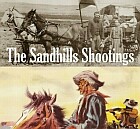
Be reading this
western ebook in UNDER A MINUTE!
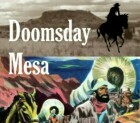
Be reading this
western ebook in
UNDER A MINUTE!

Click here for details
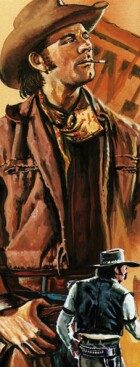
|

David Whitehead

Paul Green
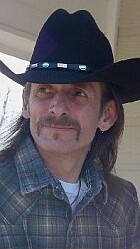
Cody Wells
|
Meet the BHW newcomers. . .
RIDERS OF THE TENDERFOOT TRAIL
DAVID WHITEHEAD (aka Ben Bridges) has been a Black Horse Western
author since the line's inception in 1986. Here he introduces and
interviews two new contributors to the series, Paul Green and
Malcolm Elliott-Davy (aka Cody Wells). Their first books
are The Devil's Payroll (December) and Six Ways of Dying (January).
John Harrison, a lawyer turned bounty hunter, found himself
entangled
in a web of intrigue after capturing fugitive outlaw Clay Barton.
The beautiful Maggie Sloane persuaded him to allow Barton to lead
them
to the loot robbed from an army payroll. But things became
complicated
when Barton double-crossed them and Maggie was kidnapped by the
mysterious Leo Gabriel.
With the veteran buffalo soldier, Sergeant
Eli
Johnson, at his side, Harrison battled ruthless vaqueros and a
Comanche war party to recover the money, recapture Barton and rescue
Maggie. But a further surprise awaited him when he finally caught
up with his enemies....
– Back cover
The Devil's Payroll
In his wildest dreams, Angelo never imagined he would forge such
an unusual partnership – with an old man, two tough brothers, their
hired
gunmen, and a treasure map! Though it started well, in less time
than it took to cock a Colt the whole deal was going bad. Determined
to get even, Angelo set out to track down the men who double-crossed
him. Only this time he was saddled with an arrogant cavalry officer,
some raw recruits and a beautiful girl with whom he had fallen
helplessly in love.
Upon meeting Ulzana, the Apache renegade, they
found
themselves outnumbered and exhausted. But Angelo didn't give a damn
about the odds. If he had to go down, he'd go down fighting.
– Back cover
Six Ways of Dying
Paul Green is 44, married to Emma and lives in West Yorkshire. His
background is in mental health nursing and he is now employed in the
National Health Service as a cognitive behavioural psychotherapist.
He has been writing articles for professional journals for many
years, mainly about mental health, but arts and culture, too.
"However, I was always a frustrated novelist and am now pleased to
be doing something I have always wanted to do. As a child I was
always day-dreaming and making up stories in my head. It finally
seems to have paid off."
Malcolm Elliott-Davy, aka Cody Wells, is originally from the UK. He
moved to Texas almost 12 years ago to help run a rescue centre for
wolves and wolf-dogs. From there he moved to Louisiana and started
a business dealing in leather goods. He is by trade a leathersmith.
"I specialized in western gun rigs. No surprise there! Also holsters
and gun belts, which ranged from original designs to the Hollywood
styles seen in most movies."
Eventually Malcolm started making leather wares for Civil War
re-enactors, everything from sabre belts with fittings to fully
furnished McClellan saddles. With the future looking bright he moved
to California to be with his partner, Sherry, unaware that a
recession was just around the corner. When his business took a
tumble overnight, Malcolm decided to go back to writing short
stories. He'd always loved to write, even from a very early age.
"I think the very first story I wrote was a western called Leave
Your Guns at Home. I was twelve years old. I never took my writing
seriously, even when I was praised by my English teacher, who told
me I had a talent for telling stories. I might have had the talent,
but I didn't have the necessary skills to present the stories in
word form so that others could enjoy them. That came later from my
mentor, to whom I owe a great deal. Without his guidance and belief
in me, I know I would never have dared submit any MS to a reputable
publisher."
David: What attracted you to the western genre to begin with?
Paul: I always enjoyed reading westerns and watching them on
television. Apart from that, it's a genre which enables the writer
to cover a broad range of themes and write many different kinds of
story. I studied history before getting involved in mental
health, and liked the idea of writing something set in the past. My
imagination was stimulated by the immense landscapes, by the potential
for conflict at a time when most people carried a gun, and by the
violent, lawless nature of a society going through a lot of change.
Cody: For me it was being introduced to the cowboy by my father at a
very early age. Be it in comic books or movies, it had an enormous
impact which is still with me to this day. When I was a boy, there
was an abundance of westerns in one form or another. The main
feature on the Saturday morning picture shows for kids was always a
cowboy. The TV westerns were in full swing and I would never miss
any of the shows being aired. I'd be enthralled as I watched some of
my favourite shows like Have Gun Will Travel, Wagon Train and Rawhide
to name just three.
Afterwards I'd go and play with my toy cowboys
and make them act out stories I’d created in my head. All my friends
had an assortment of toy soldiers, ranging from Romans to World War
II commandos. My collection consisted solely of cowboys and Indians.
I just couldn't get enough of them. So I think it was inevitable
that if I was going to write, it was going to be in the western
genre.
|
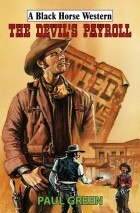
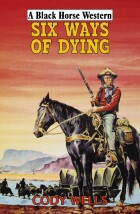
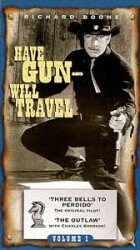
|
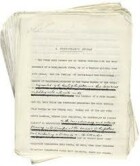
|
David: What did you learn from writing your books?
Paul: The most important thing was learning that I could actually
complete a novel and sustain my own excitement about the project all
the way through. I did encounter some difficulties, however, which
proved to be important learning experiences. The most significant of
these was my decision to sit down and just write the story without a
very detailed plan in advance. This resulted in the story becoming
over-complicated and too long, which took quite a lot of effort to
put right. I think that planning the story more carefully to start
with would have saved me a lot of time and trouble. Having said
that, I know that there are writers who successfully complete novels
without planning them out too much, so it may just reflect my own
limitations as a writer.
Cody: Where do I begin? I've learned so much from this book. I've
learned to be ruthless when editing. Cutting chunks of the MS to
make it a tight, clean read works extremely well. This I learned
from yourself, David, whom I consider my mentor. At first I couldn't bring
myself to delete some of the dialogue, descriptions etc. which I'd
so painstakingly written, and which I believed at the time enhanced
the storyline. But the truth was, once I hacked away at it, it began
to look much smoother. I never really thought of editing being so
vital, but it is without a doubt one of the most essential parts of
writing.
I was also surprised when my characters seemed to take on a life of
their own. Certain tasks I'd give them just seemed awkward and no
matter how I would write the scenario, it just didn't work. In the
end, the characters would tell me how they would react to a certain
situation. I don't know if this is normal, but it is the way I
watched my characters develop.
David: How did you feel when you received that all-important
acceptance?
Paul: It took me several minutes to take it in. I kept saying "I
don't believe it" but I was overjoyed once I recovered from the
shock. It's something I've always dreamed about, and it was an
incredible feeling to have that dream come true.
Cody: I remember that day as if it were yesterday. My better half
handed me the envelope containing the answer I'd been anxiously
waiting for from the publishers, Robert Hale. She was more excited
than I was. I remember placing it on my desk, sitting back and
staring at it for several minutes before making a cup of coffee. I
just couldn’t bring myself to open it.
|
|

|
I'd heard so many stories about first submissions being rejected,
especially those presented by unknown authors. I really had mixed
feelings of how I was going to take the bad news. At best I was
hoping Hale would give me some indication that my writing showed
promise. I'd even received mail from fellow authors telling me not
to feel bad about rejection, but to keep on writing and eventually
I'd make it. To be truthful, this did nothing for my
self-confidence. Taking the letter in hand and before I even read
the first word, I thought to myself, well, if nothing else I could
rewrite it and self-publish the story. My mouth opened wide, my eyes
bulged and I began to shake. My very first MS submitted to Hale had
been accepted! The only thing the publisher wanted was to change the
title, from Six Ways of Dyin' to Six Ways of Dying.
I was numb. My
better half was full of congratulations and she for one never
doubted my story being accepted for one minute. I think it took
twenty four hours before it actually sank in that I was now a BHW
author. I still can't believe it! Expecting the worst, then
receiving the very best news one could possibly get ... well, words
alone cannot describe how one feels to be part of a well established
group of writers.
David: Can you tell us something about your follow-up projects?
Paul: I completed a second novel but there were a lot of flaws in it
so the project didn't work out. However, it was an important
learning experience and I'm now focused on researching a story set
against the background of the civil war in Mexico, which occurred
when President Juarez was overthrown and an Austrian prince was
installed by the French as Emperor, against the wishes of the
Mexican people. The plot involves a US army officer recruited to
smuggle guns across the border to aid the rebels. He is double
crossed by his second in command and left for dead. He is rescued
and then faces a struggle to avenge his companions, get the guns
back and complete his mission. It’s called Guns of Juarez and so
far I'm really pleased with it. There's already been the capture of
prisoners, rescue of the love interest and build-up to a battle with
the Apaches. [This book has now been accepted for publication as The
Gun Runners.]
Cody: I originally wanted the follow-up to my first book to be
another story in the Angelo series. I began writing the first draft
and after 14,000 words something told me to put this on hold and
hopefully make it my third BHW. As this was the third time I'd
written about Angelo, I felt as if I needed a new challenge.
I always seem to have plenty of stories running through my head, but
what I was looking for was a new kind of character for my second
book.
I came up with Joe Branigan, a lawman, in The Badge and the Gun.
While trying to catch a train out of Santa Rosa to 'Frisco with his
prisoner, Joe stumbles upon a corrupt judge, clashes with
lumberjacks and is threatened by the local hothead who wants to
avenge his father's death and make a name for himself as a
gunfighter. There will be many twists and turns with an unexpected
climax.
Mystery, intrigue and a touch of romance are some of the ingredients
of my new book, which I’m sure the reader will enjoy.
David: What plans do you have for your future writing? Will you
stick with westerns or expand into other genres?
Paul: I would certainly like to write more westerns but also have
ideas for other historical novels. Unfortunately, I suffer from the
disease of wanting to be taken seriously by critics, and this may
cloud my judgement sometimes. I'll just have to rely on my gut
instinct and write what I actually want to write. After all, if the
story isn't the one I want to tell, why should anyone else bother to
read it?
Cody: I think of the western genre as my number one obsession, and I
guess it always will be. But one day I'd like to finish a fantasy
novel I've been working on, revolving around a Viking warrior who
has been banished from Asgard. I'm also a third of the way through
writing a ghost story. But these will have to take a back seat for a
while as I want to get established as a western writer. This is
where I feel most comfortable.
As a postscript, Malcolm sent BH Extra this picture and story:
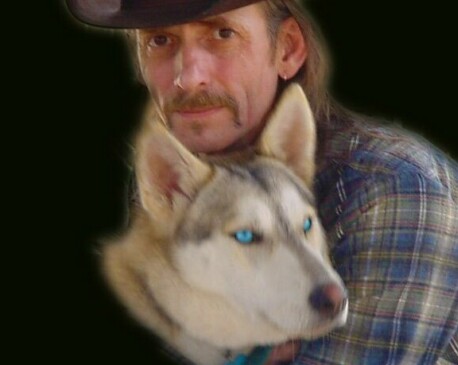
Since I'd been around dogs most of my life and with wolves and
wolf-dogs for almost two decades, it seemed only fitting that I
included one such friend in my story. I decided to base Mr Jinx on
my wolf-dog Duma (a Polish name meaning proud one), who is 75% wolf.
Mr Jinx was a loner and fended for himself until Angelo showed him a
little kindness. And because of that, Mr Jinx would willingly lay
down his life for Angelo.
At the rescue centre where Duma was born there were three wolf-dog
packs. She was the only red pup out of all her eight siblings. So
she always seemed special. If any of the wolves from the other two
packs came near to her territory she'd warn them off, despite her
age and size. We bonded very quickly and I'd purposely leave food
from my plate to give to her as a special treat.
|
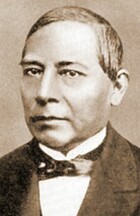
Benito Juarez
|
|
|
When she was three months old, my circumstances changed and I had to
move away. There was never a day gone by when wouldn't worry about
the little gal. Then one day I received phone call to say that the
pack had been savaged by a group of wild boar. She had been trying
to protect her mother and siblings and paid a heavy price. She had
been badly gored in the abdomen, groin and shoulder. She'd been left
for dead.
I drove across state to pick her up. It was pitiful to see the
aftermath of the attack. Several wolves had been killed and more had
severe wounds. I took Duma home with me and nursed her back to
health. Since then she has never left my side and certainly is my
protector. She remembered the love and kindness I showed her and in
return I know for a fact she would lay down her life for me. Just
like Mr Jinx and Angelo. So now you know where the idea came from
for Mr Jinx.
Duma is a she and Jinx is a he; I just thought a male dog would
be more acceptable as the (at times) aggressive character that he
is.
|
|
|
|
|
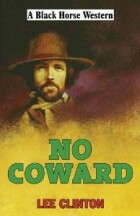
Character, grit, humour.
|
Making a mark on the western scene
HOOFPRINTS
This edition of the Extra identifies final
offerings from the BHW stable for 2011, and the books that will ring in the
New Year. They include No Coward, listed for January 2012. It's the second BHW title by Australian author Leigh Alver, who writes as Lee Clinton – Clinton being his unused middle name. His first book, Raking Hell, was released in early 2011 and is in the gritty adventure style where the lines of justice and retribution often blur. No Coward
is again gritty in nature, but told with a touch of humour. A young and trusting
Texas cowboy finds himself in an unlikely partnership with an aging US Marshal,
who has been commissioned by the Department of Justice to hunt down the killers
of a federal judge. Marshal Owens has a flexible morality when it
comes to the law, and the relationship between older lawman and youthful
cowhand puts their individual codes of honour to the test. As in all good
adventure stories things don’t always go according to plan, and nothing is
entirely as it seems. While Leigh considers himself a hobby writer, he has
been at it now for more than ten years. Only this year did he get to taste
publishing success – with his third submission to Robert Hale Ltd. He says,
"A lesson for budding authors is that triumph usually requires a good deal
of persistence." Word has it he is working on a third BHW.... His website
can be found here.

|
|
|
"Definitely worth picking up a copy, if you can find one," said Steve M
of The Outlaw and the Lady by Chap O'Keefe when he reviewed it for
Western Fiction Review three years ago. And at last the hard-to-find,
1994 BHW is being reissued – as a Dales Western by Magna Large
Print Books. This is the O'Keefe western that almost became a movie
after a review appeared in a daily newspaper. "You could as well
have been watching a movie as reading a book," the New Zealand Herald's book critic
said on Saturday. Come Monday morning the phone was ringing. NZ movie
men Murray Francis, of Paradise
Pictures, and Kevin Chisnall,
of Action Associates, had seen the article and agreed the Southern Alps
could double for the Colorado Rockies ... with no pesky ski resorts or airplanes
in the camera's way either! Chap tells us he pointed out another bonus. Many
of the story's principal characters were British nobility and could be cast
locally, although an American star would be needed for hero Tod Larraby. "I met the film makers at a restaurant for a working
lunch and visited Kevin's home in the
Waitakere Ranges in West Auckland, the location for TV's Hercules and
Zena. Murray and Kevin read the
book and were keen to see a screenplay. So I wrote
one while Kevin scouted out locations and even had cast and crew
accommodation in mind, but that was as close as a film got to being
made. Dollars and cents had the final
say. Even a budget movie costs millions. An international
backer with deep pockets couldn't be found for a western at the
time, so the plan fell through, leaving me with the unused,
unpaid-for,
first-draft screenplay. Not too big a loss.... It's no great job
to turn a 160-page, fast-moving BHW into a 90-minute screenplay."
Hoofprints asks, "Any producer out there looking for a western
script?"
|
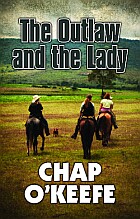
Movie that never was.
|
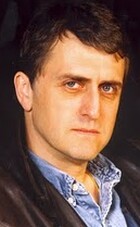
Publishing choices.
|
Stephen Leather
doesn't write westerns – he's a bestselling UK thriller writer in both print
and ebooks. He answered for Writing Magazine a question that has been occupying
a few of the Extra's readers: "I think most writers aren’t that productive
and so they will follow one route – either publish with an established publisher,
or publish ebooks themselves. I don’t think many will be able to do both.
Also, self-publishing ebooks is very hard work. When a traditional publisher
releases a book they do all the production, marketing, promotion and publicity.
They edit the book, they produce the cover, they arrange press reviews, they
make sure the book is in all the stores and supermarkets, they pay for advertising.
But when you self-publish, you have to do that yourself which takes a lot
of time and effort. Most successful ebook authors who self-publish seem to
spend almost as much time marketing and promoting their work as they do writing.
Not every writer is prepared to put that amount of effort into self-promotion....
Personally I believe most writers would benefit from a publishing deal with
a proper publisher, but if they can’t get a publishing deal they should definitely
look at publishing their own work.... If your book is good and your cover
works, then it’s down to marketing and luck. You have to promote your book
in any way you can, but from then on it’s a question of whether that
all-important word-of-mouth recommendation kicks in. And I’m afraid a lot
of the time it’s down to luck."

|
|
|
At
the time this edition of the Extra was "put to bed", BHW writers and readers
were waiting with anticipation to see what kind of marketing, promotion and
publicity efforts would be put behind publisher Robert Hale Ltd's BHW ebooks.
Writers with BHW ebooks coming up confirmed that none of the work would
be done "in house" but would continue to be farmed out to agencies. One said,
"The terms are crap, but the way I look at it is it can't hurt to have it
out there. And besides I'm not expecting to make any real money from this."
For UK readers, the Hale ebooks would be priced at £3.99. After the
outside agencies and the taxman had taken their cuts – and assuming the £3.99
would not be discounted – just £1.28 would be left for the people at
Clerkenwell House. Of this sum, called "net cash proceeds", Hale would
earmark 25% (or 32 pence) for the book's author. Another writer accepting
the deal said, "The managing director, Gill Jackson, laid things on
the line pretty well and explained the venture was a new one. It's not thought
anyone's going to get rich out of it, but times are changing. I felt that
this old dinosaur should try to move into the 21st century, even though I
hadn't quite mastered the twentieth. I still think horsepower was best when
only the horses had it."
|

Summed up. |
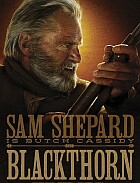
Praise for indies.
|
Matt Patches
at Hollywood.com reminded us that out of IMDb's Top Fifty Western films of all
time, only five were made after 1990. He said, "Kind of amazing, considering
the genre was one of America's staples back in the early half of the 1900s,
capable of spitting out a few dozen titles in a single year. But either audiences
lost interest or westerns lost their lustre, as these days the horse-riding,
pistol-toting adventures only make their way into theatres when they're mixed
with 'blockbuster-friendly' genres (Cowboys and Aliens, Rango, Jonah Hex) or directed by auteurs with Oscar potential (the Coens' True Grit)."
The report went on to say independent film makers were keeping the spirit
of the western live. "Limiting the scope is what makes Blackthorn (out on VOD and in theatres) a compelling, tension-filled western. Forget large-scale set pieces – this isn't 3:10 to Yuma or any of the other action-driven cowboy stories of late. Instead, Blackthorn unfolds a character-driven quest across a sprawling backdrop, centred on one of the more infamous bandits in history: Butch Cassidy (played by rugged writing/acting legend Sam Shepard).
The movie follows Cassidy – now living under the alias Blackthorn – as he
wraps up a twenty-year stint in Bolivia and prepares for his journey back
to America. With a horse, a gun and his life savings in hand, Cassidy makes
his way across the desert, a journey rudely interrupted by an on-the-run
criminal, Eduardo (Eduardo Noriega). After a brief skirmish, Cassidy's horse runs off, leaving the two warring men to work together for survival."

|
|
|
Kit Prate's novel Jason Kilkenny's Gun,
originally a US Tower Books paperback then a BHW, has been reissued by Western
Trail Blazer. At his blog Writing for the Brand, fellow author Peter Brandvold
called it one of the four or five best westerns ever written. "Kit, who lives
in Wisconsin with her kids and grandkids, deserved to be more prolific and
would have been if she hadn't had to work a more dependable and predictable
job to feed her family." In comments, another BHW writer acknowledged the
book as a personal favourite and told of emails he'd exchanged with its author
at the time of the Hale edition. "She told me, 'Kit Prate is my legal name.
Kit, however, is short for Kathryn. I grew up a raging tomboy in Illinois;
not far from Clarence Mulford's home town.'" Kit/Kathryn didn't seem
too bothered about Hale's censorship cuts of the story's realistic coming-of-age
scenes. She wrote, "Seriously, I was surprised when Black Horse accepted
it (with a request for more; newer stuff); even more surprised when I received
the PDF proofs. They actually did a great job of editing. They
still prefer their sex (or hints thereof) ending at the bedroom door; but
the book remained pretty much intact." Peter quoted from the original, vivid
scenes, with a warning for "the squeamish", and said, "When I read this over-the-top,
wonderful novel, first published in 1981, I was reminded that words and sentences
in the hands of a great or near-great writer can pack the wallop of a quick-jabbing
boxer. Good writing is hard to define, but you know it when you read
it. You sort of hold the book a little tighter, and all the sights
and sounds of the world beyond the book grow dimmer and quieter, and you
feel the throb of life a little deeper in your bones."

|
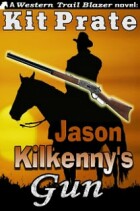
Fine book restored.
|
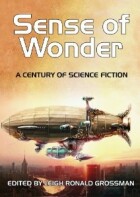
Unmatched.
|
Western fans often look with envy at other, better supported genres ... like SF. Leigh Ronald Grossman has just edited a monster anthology, Sense of Wonder, a Century of Science Fiction. Frederik Pohl,
who as even western fans know is a grandmaster of SF, said at his blog, "The
book is definitely not summer hammock reading. You might not break the hammock,
but don’t drop it on your foot. Seriously, don’t drop it on your foot." He
also complained mildly about the five-pound, 992-page book's very small typeface.
Grossman replied, "The idea was to fit as many stories as possible while
keeping the book inexpensive for the college students who will be its main
audience. Luckily, they have 20-year-old eyes; I thought they would appreciate
having a $50 textbook with small type over a $150 one with larger type. At
approximately 2 million words, I think it’s the largest single-volume SF
anthology out there." He also said, "I wanted to convey the relationship
between writing, editing, and fandom that’s so vital to the field but tends
to get left out of other SF texts." A cult following has always nurtured
and preserved science fiction and fantasy. Oh, how jealous it makes the western
writers and readers! Will someone out there please put together a similarly monster-sized,
scholarly Century of Westerns?

|
|
|
As Paddy Gallagher, aka Greg Mitchell, was telling Extra readers last time about real cowboys, bandannas and collarless shirts, Euroweekly News columnist Jim Collins
was simultaneously telling his readers how "The Cowboy Filmmakers" riddled
their epics with anachronisms: "Nineteenth century, and yet they have 'collar-attached'
shirts, sometimes even 'button-down'." Nik (aka Ross) Morton,
who lives in Spain, sent an email to EWN's editor with a link to the Extra,
and an email to us which we forwarded to Paddy. "The article ties in nicely
with mine," Paddy responded. "But there is one aspect where the writer got
his wires crossed. Collar-attached shirts have been around a long time....
As the writer mentioned, they did have to be pulled on and off over the head and
these were common here in Australia until about the 1960s. They were usually
of heavier material than the business shirt that was really designed to be
worn under a coat. In my library I have photos of men wearing collar-attached
shirts taken in the late 1860s. I have seen a contemporary print of an 1860s
Australian explorer wearing a similar shirt with two breast pockets. The
last photo taken of the bushranger Ned Kelly, in 1880, shows the
same sort of shirt.... The big advantage of the detached-collar shirt was that
it did not need to be washed so often and clean collars could be used daily.
There were even throw-away paper collars. The military liked collarless shirts
because with some of the high-collared tunics they wore a shirt collar could
be a nuisance. Shirts of this type lasted until after World War II."

|

Shirt tales.
|

Facts about brush.
|
Reader John Duncklee wrote to question Paddy Gallagher's
mention of cowboys' wearing of protective cuffs and the disappearance of "shrubs". Paddy
replied, "It was never implied real cowboys these days wear cuffs. In Mr
Duncklee's lifetime, cowboys probably have had no need for leather cuffs.
He would have been working on land that had seen about a century of white
man's intrusion. It would be interesting to know the size of the Arizonan
ranch he worked on, but the American ranch is not very big. Even if there
was still open range in some places, the days of wild cattle hiding out in
the brush would be long gone. In my days working for Australian Customs I had quite a few conversations
with visiting cowboys and ranchers. The last figure I heard was that the
average ranch was 160 acres, not enough to be called a farm in Australia,
so it would hardly be covered with brush...." On shrubs, John claimed, "After
more people came westward and controlled wildfires, the grasses diminished
and the shrubs not only increased where they had been, but also invaded former
grasslands." Paddy said, "I did not use the word 'shrubs' but 'brush', the
generic term for close-growing trees of any or several types. Nor did I mean
to imply the brush disappeared through some magical process of nature. The
disappearance was more man-made. The fenced areas of most ranches were intended
for cattle grazing, or maybe crops, and for this purpose the brush was removed....
I think Mr Duncklee and I are talking about different things. He is talking
about encroachment of various plants and I am talking about the clearing
of range land."

|
|
|
Noting the five BHW ebooks announced for October, the Extra recorded last edition that one of these, The Kansas Fast Gun,
was enjoying its third release by Robert Hale Ltd, having been published
as a hardback book in 1958 and 2009. Although the third appearance seemed
unusual, it transpires Arthur Kent's book wasn't being singled out for unique attention. An alert BHW follower pointed us to a listing of A Colt for the Kid by John Saunders
at the used-books website Abebooks. As well as being chosen for ebook reissue
in 2010 after being a BHW in 2009, this book was also previously published by Hale, in
1960. The bookseller described his ex-library book offering as: "Hardcover.
Book condition: Fair. Dust jacket condition: Good. First edition. Unclipped
DJ cut short. Tape marks to flyleaves. Name on half-title page along with
tape marks and fade discolouring. Solid square copy of scarce title. 156pp."
Seems the dealer will have to forget the "scarce" bit from now on! More detective
work revealed John Saunders was a pen-name for Merseysider Arthur Thomas Nickson,
who was born in 1902 in Liverpool. He wrote westerns
in the 1950s and '60s for UK publishers Herbert Jenkins, Ward Lock, and Mills
& Boon. His other pen-names were Arthur Thomas, Arthur Hodson, Roy Peters and Matt Winstan. He married Hilda Pressley (born 1912), who then wrote some 60 romance novels, mainly as Hilda Nickson. She also wrote later under her maiden name and as Hilary Preston.
The first books were doctor-nurse stories for Herbert Jenkins in the '50s,
but she became a popular Mills & Boon/Harlequin writer and a vice-president
of the Romantic Novelists' Association. Arthur died in 1974.
|
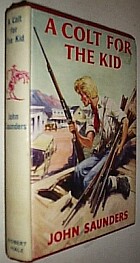
Third shot for the kid.
|
|
|
|


|
Western author Mike Stotter is back . . .
GUNFIGHT AT THE E-BOOK CORRAL
Corralled together for the first time comes an exciting collection
of
short stories by Mike Stotter that captures the imagination of the
American Old West. Iconic themes of the Old West are given a new
lease
of life and you'll be exhausted at the end of your ride!
– Back cover
Six Trails West
THE ebook has been called a "great invention in search of a name".
Sony declared that theirs had been "invented especially for book
lovers". The many makers are competing for the new generation of
readers seemingly threatening the traditional book. But are they?
Firstly, paper lends itself to human action and habit. We carry it,
we fold it, we write on it. The physicality of paper is both
familiar and comforting. Paper is deeply ingrained in our psyche as
something you can rely on. We use paper as part of our learning
process. Writing is a physical representation of the thought process
and writing needs paper. It is a temporary holding pattern for ideas
that cannot immediately be categorized.
Throughout our education and in popular culture, the notion that if
it's not recorded on paper, it doesn't count, has incredibly
influenced our collective habits – habits that take time to change.
Publishing is changing, and as with any successful technology
implementation, it all comes down to the willingness of people to
use it. The advent of television didn't see off the radio, nor did
it damage the world of cinema. There was an enhancement. Actors
from radio crossed over to television, television stars appeared in
the movies, and vice-versa. It was an amazing opportunity for all
involved, and I think this is where the ebook and hard copy can live
in symbiosis. As someone who writes online and is published in the
hard copy world, I am standing in two camps and can see the
advantages of both.
With that in mind I took the bull by the horns and issued one of my
earliest westerns, McKinney's Revenge, and a collection of short
stories called Six Trails West through the Amazon self-publishing
programme. I am currently transferring those others that are only
available in print. It's a long and hard trail but I think it will
be worth it.
|
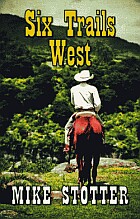
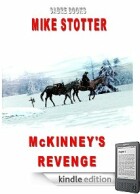
|
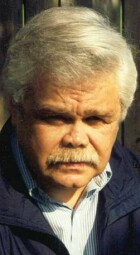
Ed Gorman
|
How successful my or others' western fiction ebooks are is another
matter. A quick search on Amazon brings up the usual suspects: Zane
Grey and Louis L'Amour plus a fistful of other names that pass me
by; but most surprisingly none by Elmore Leonard. There doesn't seem
to be a lot out there but the genre seems to remain a favourite
amongst readers. Could it have something to do with a generation
thing?
If memory serves, a demographic poll taken some time back, showed
that western fans were (in the UK) from the Midlands, in their late
50s and mainly men. Could it be that there is some reluctance from
them to embrace the new-fangled gizmo called a Kindle? Without
seeing further evidence, I wouldn't like to endorse the above. I'm
in my 50s and I love gadgets, though I live south of the Midlands.
As a writer, I want my works read in any medium whatsoever. And my
sales figures split 50/50 between the US and UK, so that tells me
nothing except that readers are out there – somewhere.
I have spoken to publishers on the subject of westerns and they all
seem to be waiting again for the resurgence of the genre. They
thought Clint Eastwood’s The Unforgiven would herald a raft of
revisionist westerns and hey presto, the whole genre would be
rejuvenated. We all know that didn't happen and I very much doubt
that it will now.
Ed Gorman made a good point to me a couple of years back on the
decline of the popularity of westerns. It had to do with the shift
in society from an agricultural society to that of city dwellers –
no one was interested in the Great Plains any more and the
popularity of crime fiction and writers such as Michael Connelly,
Denis Lehane etc. increased. I responded with, what are westerns if
not crime on horseback?
|
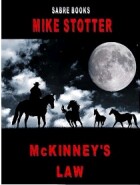
|

George Pelecanos
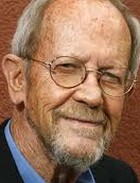
Elmore Leonard
|
Talking to US crime writer George Pelecanos recently, I mentioned
that many of his themes and characters are pure classic western and
would he ever think of writing one? He said that it is something he
would consider. Likewise when Elmore Leonard was in town recently to
promote season two of Justified (a modern-day western if ever there
was one), he said to me that the book after next will be an expanded
version of The Tonto Woman. So big names can be a draw to the genre.
We just have to capitalize on that.
How can we, as writers, tackle the lack of readers for our
products? It's a big ask. Is there a call in Britain for a Western
Writers' Association in the same vein as the Western Writers of
America? Is there an audience (and by that I mean punters) for it?
I don't know if strategies can be put into place to attract the
disinterested reader, except that each and every one of us will need
to promote ourselves to the small fan base that already exists out
there. And where is that? Apart from individual websites and places
like Black Horse Extra we are very limited as to where we can turn.
In that respect, do we have to create the marketplace itself? That
is a challenge in itself.
I have not been published by Robert Hale for some time. Therefore I do
not know what digital rights are in the new contract, but I suspect
it is a very poor percentage for the writer. One question to ask is
can you delete that clause and still be published in hard print or
would Hale reject the contract in its entirety? I am sure that many
of us do not have an agent so will have to turn to the Society of
Authors for help.
And what is Robert Hale doing to promote ebooks? I looked on their
site and there was ... nada. I had to return to Amazon to find the
Black Horse Westerns Collection No. 1 priced £6.66. Did you know that
in the US readers have got together and will not buy any ebook
priced over $2.50? Set a price below the magical £2, or ideally
99p, and you've got a better chance of selling to the drive-by
reader.
|
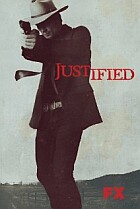
|


|
Or perhaps bite the bullet and put one title up for free and see if
there is any take-up. A lot of titles out there already can be
downloaded for free. For example: Free Online Westerns.
Okay, a lot of older stuff is there but if it generates interest,
you might get lucky. And Gary Dobbs at his Tainted Archive website
also indicates where you can get a free read.
Is producing an ebook a step in the right direction? Damn straight
it is! Take this for instance: "According to new statistics from the
Association of American Publishers, ebook sales have grown
from 0.6% of the total trade market share in 2008 to 6.4
% in 2010."
While ebooks are still only a small portion of book sales, the
report points out, "It translates to 1274.1% in publisher net sales
revenue year-over-year with total net revenue for 2010 at $878
million. Net unit sales growth for ebooks was equally impressive,
increasing 1039.6% for the same three-year period. In 2010, ebook
net units were 114 million."
As ebooks grew, mass-market paperback sales dropped. Total net sales
revenue for mass-market paperbacks in 2010 was $1.28 billion, a 13.8% change since 2008.
If sales of ebook westerns could take just 0.11% of that market,
then it would be a big step forward.
One thing we should not do is give up. Admit it, we are never going
to become rich writing westerns. But are we in it for the money or
the sheer enjoyment of writing? As far as I am concerned, it is the
latter. And that's why I have returned to McKinney and the ensemble
and have finished the first draft of McKinney’s War. It was fun
getting back into the characters' heads and even taking the chance
to alter my style for the start of it. While writing that, along
came the idea of expanding a short story called The Making of Jared
Dodds which appears in Six Trails West. By the way, this ebook anthology
will be out on paper at Christmas time – as a Dales edition from Magna Large
Print Books.
I must really thank David Whitehead (aka Ben Bridges et al) for all
his support in my Black Dog Days and getting me back into the
saddle.
– Mike Stotter, whose new story collection, Six Trails West,
will be
published in large print in December
|
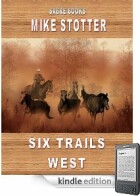
|
|
|
|
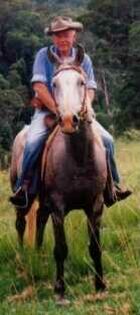
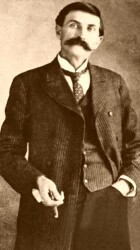
Pat Garrett
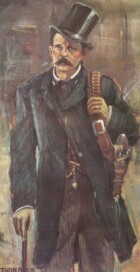
Ben Thompson
|
Greg Mitchell shoots down some myths
THE GUNFIGHTERS AND THEIR WEAPONS
Mickey Dole's gang had broken jail, killing and plundering in
their bid for freedom. Ranch-hand Clem Shaw joined a posse that
included a devious bounty-hunter and a reluctant lawman.
As the
hunt progressed, Clem realized that the situation was not as
clear-cut as he'd thought: not all his enemies were in the fugitive
gang, which was divided amongst itself. There would be more deaths
and shootouts before Clem unravelled the puzzle – and found
himself on the wrong end of a gun.
– Back cover
Breakout
THEY are the backbone of the western genre, quick-draw artists who
never miss a shot, although traditionally heroes shoot better than
villains. In cow town streets, crowded saloons or the open prairie,
walking, running or riding, they are equally adept at dealing out
death and sometimes justice.
They were the deadly gunmen of the Old West but in reality few were
in the heroic mould. Some of the deadliest died as they had lived,
by the gun, but not in particularly glorious circumstances.
Wild Bill Hickok, whose skill with guns was legendary, was shot in
the back of the head without a chance to defend himself. Jesse James
suffered a similar fate, as did John Wesley Hardin, another
notorious man-killer. Billy the Kid had no chance to defend himself,
and his killer, Pat Garrett, was killed years later, shot in the
head before he could draw a weapon. Ben Thompson and King Fisher
were reckoned a deadly duo at the time, but both were shot in a
music-hall ambush without a chance to draw a gun.
The exact number of men killed by those mentioned above will never
be known. Exaggerated accounts from questionable sources have
muddied the waters of history so that accurate figures cannot be
calculated. Conservatively, the body count would top a hundred. By
contrast the number of men they killed in face-to-face duels could
be counted on a person's fingers. They survived their share of gun
battles but not in the manner so often described in western fiction.
Some of these gunfighters were belligerent drunks, some were bullies
or psychopaths safe in the knowledge that they shot better than
anyone else around them. At some stage several had been lawmen
despite their dubious pasts.
Wyatt Earp and Bat Masterson did not die violent deaths, nor did Doc
Holliday, but two of Wyatt's brothers, Morgan and Warren, were
killed. Neither had a proper chance to defend himself. Nor did Bill
Tilghman, a much-respected lawman, killed by a drunk
Fiction is full of accounts where known gunfighters were challenged
by hopefuls seeking reputations as if man-killing was a sporting
event. The reality is that it is hard to find an incident where one
gunfighter with a great reputation was involved in a shootout with a
man of similar ability. Most of their victims did not possess the
same shooting skill, so the odds were well and truly on the
gunfighter's side. But when faced by an equal with the real prospect
of getting killed, it seemed that diplomacy was used in settling
disputes.
Ben Thompson was well aware of the gap between the professional and
the enthusiastic amateur and always let his opponent shoot first. He
claimed that the first shot always missed and the courts would rule
self-defence when his well-aimed shot finished his opponent.
Thompson claimed that he never missed and is reported to have given
demonstrations in Buffalo Bill Cody's Wild West Show.
King Fisher was one of the few two-gun men who was a deadly shot
with either hand but he was smart enough not to tangle with the
Texas Rangers even though he might have been a better gunfighter
than any individual ranger. A former ranger wrote that Fisher would
surrender to a Mexican burro if it wore a ranger's badge.
Thompson and Fisher were a lethal pair whose shooting skills did not
save them when shot down by concealed gunmen before either could
draw a weapon.
|
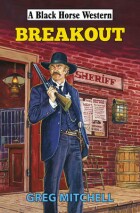
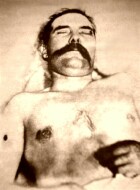
John Wesley Hardin
|
|
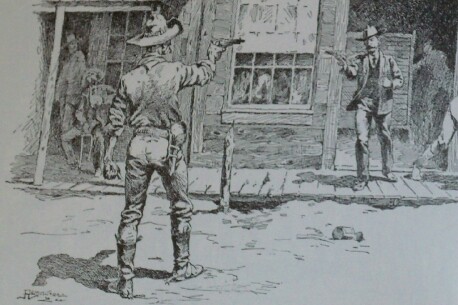
Duel by Frederic Remington. Note that the men are aiming. No shooting from the hip here.
|
|

|
The closest to the traditional Hollywood duel was when Hickok and a
gambler named Dave Tutt met each other in the town square of
Springfield, Missouri, in 1865. As they walked toward each other
both men drew and fired. Tutt missed and received a bullet in the
heart. Some reports put fifty yards (45 metres) between the pair but
it could have been closer. Wild Bill's choice of a weapon is
uncertain but it was thought to be a a cap-and-ball, .44 Army Colt.
Such a weapon had the range and accuracy for a fifty-yard kill and
Hickok was an exceptional shot. However, a quick draw and a
perfectly placed bullet at even half that range would be good
shooting for any fictional hero.
Much has been written about the stopping power of various bullets
and anyone who saw the classic movie Shane would have
been impressed by the scene where a man is thrown backwards under
the impact of a .45 slug, although modern research has shown that
the force of a revolver bullet is similar to being hit with a thrown
baseball. If the bullet hits a bone, or the victim is shocked by the
realization they have been shot, they might fall, but a determined
man can remain standing.
Tests have shown that the striking power of a bullet is equal to the
amount of recoil from the gun. The impact of a single revolver
bullet will only knock a man off his feet if he is killed instantly
by a shot to the brain or the upper part of the spine. If a person
is not killed outright and they are aggressively motivated, they can
keep coming even though mortally wounded.
The US Army found this out the hard way when they replaced the
single-action Colt .45 with the double-action .38 Long Colt
revolver. The latter proved ineffectual against suicide attacks from
blade-wielding Moro tribesmen in the Philippines. Some of the old
.45 revolvers with their heavier and larger diameter bullets were
put back into service. Later, the 1911 .45 Colt automatic pistol
was adopted. With a faster-moving, large-diameter, heavy bullet the
new pistol made up for the deficiencies of the .38 Long Colt, but to
stop a man the bullet still had to hit a vital area.
Cases examined by the FBI have shown that a man shot through the
heart can live up to 15 seconds before the brain shuts down. Many
game shooters can tell of heart-shot animals running up to a hundred
yards (90 metres) before falling dead.
Compared to the surface of the human body, a bullet hole is
comparatively small so that the larger the diameter and the faster
the bullet, the larger the wound and the more effective it is. A
really effective man-stopper must have the power to penetrate twelve
inches (30 cm) of human tissue. Many of the 19th century revolver
bullets lacked that degree of penetration. Additionally, bullets do
not always follow straight paths. Clothing and even strands of
clothing carried into the wound can alter the slug's path. Sometimes
a bone can deflect it.
We are all familiar with the movie scene where the hero, with one
quick revolver shot brings down both horse and rider. As one who has
occasionally had to shoot suffering horses, I know that only a shot
to the brain will knock a horse off its feet, and hitting the brain,
even at close range with a stationary target, requires very careful
aiming. Old cavalrymen sometimes did not know that their horses were
wounded until unsaddling them later. It would require a perfectly
aimed shot to the brain to bring down a galloping horse with a
revolver. I doubt it could happen once in a thousand tries but it
does make a spectacular film scene.
Getting back to targets that return fire, recent research in the US
reveals that the average gunfight is over five yards (4.5 metres).
Five shots is the average number fired. Statistics also showed that
80% of bullets miss their targets. A wounded man is still considered
dangerous as long as he retains his hold on the gun. These are
modern statistics involving trained shooters on the law side of the
argument with well-maintained guns and reliable ammunition.
In the Old West ammunition was not always reliable, especially in
the percussion era which lasted until about 1870. The black powder
used in those weapons caused a lot of fouling and unless the
revolver was kept clean, malfunctions could occur. Twelve shots were
enough to cause cylinder rotation problems and that, combined with
slow loading, was why they were often carried in pairs.
Metallic cartridges were more reliable but the science of ballistics
was little known outside military circles. Consequently many
under-powered weapons were produced. These might have had a
deterrent effect but the odds against instantaneous, one-shot kills
were pretty long even if they hit their targets. Bulky clothing
often reduced the impact of low-velocity bullets. The .41 Remington
over-and-under derringer, so popular as a hideout weapon, had a
large bullet but a small powder charge behind it. Readers might know
of an instance where a gunfighter was killed by a pistol of this
type but I have been unable to find one.
The term "suicide special" that was often applied to cheap,
low-powered, .22 and .32 revolvers was an apt one for two reasons.
First, they were adequate for self-inflicted death, and second,
because they were a very poor choice for a man involved in a serious
gun battle.
The guns most cowboys carried were poorly maintained, and time and
expense prevented their owners from the practice required for high
proficiency. The gap between the professional shootist and the
enthusiastic amateur was considerable. This was often ignored when
one or both parties were under the influence of alcohol which
adversely affected both accuracy and self-preservation.
Gun duels were not sporting events where contestants competed on an
even basis. When lead was flying there were no rules. The most
likely winner would be the better shot with a gun suited to the
task.
– Paddy Gallagher, whose latest BHW (November) is Breakout
|
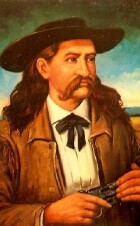
Wild Bill Hickok

Colt Army .45

Colt .38 Long Colt. The cartridge is long, not the gun.
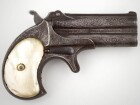
.41 Remington
over-and-under derringer

"Suicide special"
|
|
|
|



|
NEW
BLACK HORSE
WESTERN NOVELS
Published by Robert Hale Ltd in November, December and January
978
When Lightning Strikes
|
Ethan Flagg
|
0 7090 9087 8 |
In the High Bitterroots
|
William Durey
|
0
7090 9229 2
|
A Man Called Breed
|
Chuck Tyrell
|
0
7090 9256 8
|
Travelin' Money
|
Logan Winters
|
0
7090 9255 1
|
Breakout
|
Greg Mitchell
|
0 7090 9268 1
|
Cold, Hard Cash
|
Jake Douglas
|
0 7090 9299 5
|
Guns of Wrath
|
Colin Bainbridge
|
0 7090 9300 8
|
Jake Rains
|
Tony Masero
|
0
7090 9301 5
|
Sheriff Without a Star
|
I. J. Parnham
|
0
7090 9232 2
|
Running Wild
|
Corba Sunman
|
0
7090 9235 3
|
Gunsmoke Over New Mexico
|
Dale Graham
|
0
7090 9242 1
|
Comes a Horseman
|
C. J. Sommers
|
0
7090 9274 2
|
The Devil's Payroll
|
Paul Green
|
0
7090 9302 2
|
Showdown in Jeopardy
|
John Davage
|
0
7090 9304 6
|
Trouble at Mesquite Falls
|
Will Keen
|
0 7090 9313 8
|
Gun Law of Phoenix Cline
|
Terrell L. Bowers
|
0
7090 9320 6
|
Hell Stage to Lone Pine
|
Jack Dakota
|
0
7090 9190 5
|
Sheriff of Vengeance
|
Rob Hill
|
0
7090 9321 7
|
The Sons of Casey O'Donnell
|
Scott Connor
|
0
7090 9265 2
|
Pay Dirt
|
Lee Walker
|
0
7090 9332 2
|
Hell on Hoofs
|
Lance Howard
|
0
7090 9323 7
|
No Coward
|
Lee Clinton
|
0 7090 9311 4
|
The Hellrakers
|
Owen G. Irons
|
0 7090 9151 6
|
Six Ways of Dying
|
Cody Wells
|
0 7090 9328 4
|
|
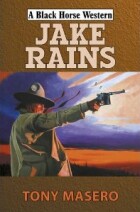
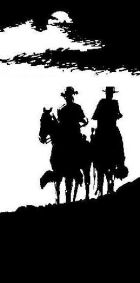
|
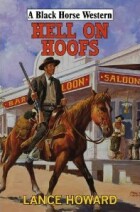
|
Black
Horse Westerns can be requested at public libraries or ordered at bookstores. They can be bought online from the publisher at www.halebooks.com,
or from other retailers including Amazon, Amazon UK, WH Smith, Blackwells
and The Book Depository ("free delivery worldwide").
Selected backlist titles are now republished as ebooks, available
in most formats from online retailers for £3.99. December titles are:
The Gallows Gang, I. J. Parnham; Drummond Takes a Hand, Alan Irwin
Trail to Fort Laramie, Jack Edwardes; Saddle Tramps, Owen G. Irons
Guns for Revenge, Steve Hayes; Track Down the Devil, Greg Mitchell
Chicanery of Paco Ibanez, Jack Sheriff; All Guns Blazing, Doug Thorne
Viva the Brazos Kid! Frank Longfellow; Shadow Man, Andrew McBride
|
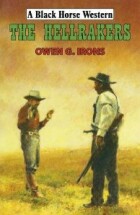
|
|
AND AS BLACK HORSE EXTRA E-BOOKS:
|
|
|
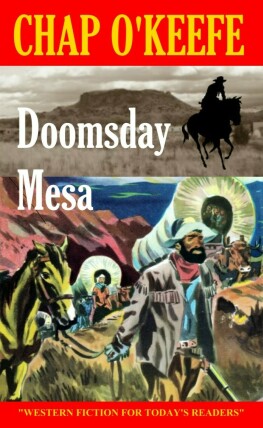
DOOMSDAY MESA, originally published as a Black Horse Western,
shows a darker side of the West.... O’Keefe mixes the bitter truths of Western
history (the Donner party cannibalism tragedy and the Sand Creek
Massacre) with a compelling fictional narrative, and the result is
another winning Western drama....
The protagonist is Yale Cannon. Once a wild, gun-toting youth, he matured while
fighting for the Union in the Civil War and was eventually appointed
as
a Deputy Marshal. He may be older, wiser, and grayer, but he hasn’t
forgotten his youth – or the girl he loved, Jane Bell. So, when he is
ordered to proceed to Antelope to bring back wanted murderer William
Effingham, he decides to find out what happened to his old crush.
But
the town of Antelope has other plans in mind for the Deputy Marshal.
Arriving
in Antelope, Cannon is mistaken for a cattle rustler cultist and
narrowly escapes a showdown. Investigating the matter further,
Cannon
discovers the town’s boiling resentment towards Brother Abel Anson
Pryor and his followers who have taken over Jerusalem Pastures,
which
the locals are now calling Doomsday Mesa. Meanwhile, Cannon seeks
out
the town elder, the Reverend Ephraim McDowell, and his daughter,
schoolteacher Kate, to learn about Jane Bell. Disaster looms,
however,
as tensions between the townspeople and the cult reach the breaking
point, and Cannon finds himself caught between two
firecrackers – Effingham and Pryor – and must save Kate’s reckless
younger
sister, Rose, before she becomes victim to her own naïve delusions.
Doomsday Mesa
is a lean book written in tough, compact prose that packs in a lot in a short space.... O’Keefe
has assembled a terrific ensemble cast whose individual stories
weave
together a complex narrative layered with drama and anticipation. As with the Misfit Lil books, O’Keefe excels at crafting rugged, independent, and
believable
female characters that defy stereotype. Kate doesn’t fit the
conventional mould of a schoolmarm whose spinster ways melt at the
first sight of the hero. Far from it! Kate is a forthright
suffragette,
and even occupies a position as one of the town’s leaders, but she’s
also cognizant of the weight of her responsibilities, both to the
town
and to her near-blind father. And of all the
characters in the book, Rose is perhaps the most relatable, human,
and
vulnerable of the bunch. Young, brash, and a romantic at heart, she
longs to run away with her lover and rebels against everything her
family stands for. How many of us were like that in our own youth?
Locating those universal emotions in his characters is what makes
O’Keefe’s West so compelling.... He doesn’t treat the
West
as some static, dusty entity, but engages with the emotional and
moral
issues the way real people would have.
Doomsday Mesa is a good
way to get to know O’Keefe, and now’s the perfect time....
– Cullen Gallagher. Read the complete review at Pulp Serenade
$2.99 at amazon.com
£2.17 at amazon.co.uk
|
|
|
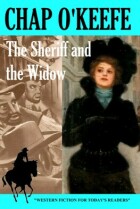
99c
amazon.com
86p
amazon.co.uk
"You could as well have been watching a movie as
reading a book. . . O'Keefe writes westerns with the
coolness of a hired gun."
– New Zealand Herald
"There's
nothing about this I didn't enjoy ... I have two O'Keefe novels on
the way and this has whetted my appetite for them.... I'm loving this western.
I was travelling today and The Sheriff and the Widow was my book for the trip."
– David Cranmer,
of Beat To a Pulp
"The Sheriff and the Widow is available now at a great, giveaway price, so how can you not afford to add this to your collection?"
–Western Fiction Review
Read an excerpt here
|
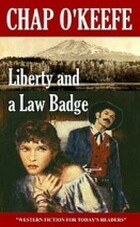
$2.99
amazon.com
£2.10
amazon..co.uk
"This book is a lot of fun, pulpish but with a sharp, contemporary edge. The dark, complex plot, the emotional angst, and the
gritty storytelling remind me very much of many westerns published in the
fifties by Gold Medal, by authors such as Lewis B. Patten, Dean Owen and
William Heuman. The pace is very fast,
the action scenes are handled well, and Joshua Dillard is a very likable
hero, tough and competent enough to handle just about any situation, despite
his occasional self-doubts, but not a superman by any means. I’m ready to
read more about him right now.... If you’re a fan of hardboiled action westerns,
I definitely think you’ll enjoy it."
– James Reasoner
|
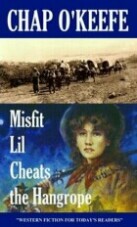
$2.99
amazon.com
£2.10
amazon.co.uk
"Take it from someone who has collected and read westerns for more than 40 years, Misfit Lil Cheats the Hangrope
stands head and shoulders above the current crop of competitors! It has a
fabulous story with – to this reader, at least – a completely unforeseen
dénouement, vivid, lively characters and regular bursts of action
which ... aren't just shoehorned in to beef things up a bit. I have read
Chap O'Keefe for a long while now, but genuinely feel that this is his best
to date!"
– David Whitehead,
aka Ben Bridges
"Read it earlier this week and it's terrific."
Cullen Gallagher,
of Pulp Serenade
|
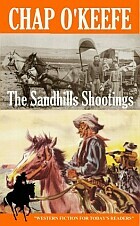
$2.99
amazon.com
£2.10
amazon..co.uk
One of Chap O'Keefe's early novels and the second
to feature range detective/hired gun Joshua Dillard. In this one, Dillard
gets a letter from his brother-in-law, who is serving as a deputy marshal
in a small town in Nebraska, asking him to come help prevent a range
war brewing in the sandhills area. At the same time,
Dillard is summoned to Omaha by a wealthy businessman who also has connections
in the sandhills. Naturally, the two cases turn out to be related, but
Dillard doesn't discover that until several attempts on his life,
in one of which he's shot and left for dead. Chap O'Keefe takes a traditional Western plot and as usual spins it into
something more with clever plot twists, well-developed and interesting characters,
and plenty of tough, hardboiled action scenes. Joshua Dillard has turned
into one of my favorite Western characters.... Available in an affordable ebook edition.... I highly recommend it.
– James Reasoner at his pulp blog Rough Edges
|

GREAT 2-FOR-1
PROMO DEAL
You have a winning hand! Play your cards right to receive absolutely free of charge one of
the five Chap O'Keefe ebooks shown above and to the left of this
announcement.
(1) Click to your Amazon.com or Amazon.co.uk Kindle store and buy any Chap O'Keefe western except The Sheriff and the Widow which is already available at a discount price.
(2) Email a request with the subject header "Second Book" to
feedback@blackhorsewesterns.com. In the body of the email, name the O'Keefe ebook you next want to
read, and state the order number you were sent by Amazon for the
ebook you have already purchased.
(3) Stand by to receive by email a PDF file of the ebook you have chosen.
(4) Put the file on your Kindle. (You'll find some tips here on how to
do that if you're unsure. But as they say, it's not rocket science!)
(5) Read.
"It's a great deal. Jump on it!"
– Randy Johnson at Not the Baseball Pitcher
|
|
|
|
|
|
|